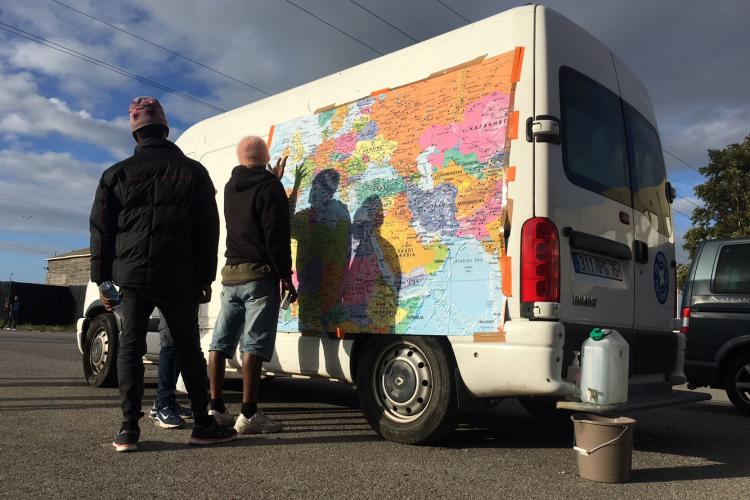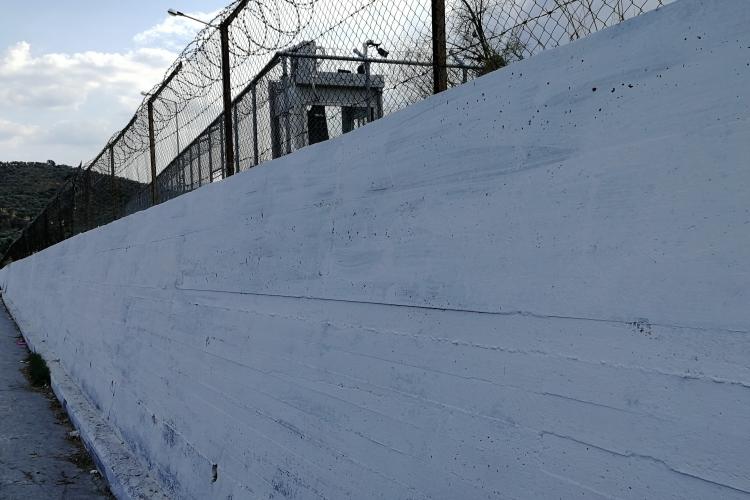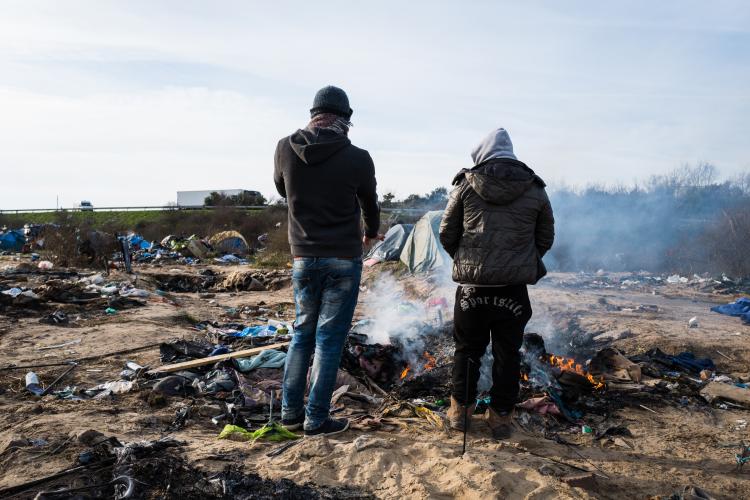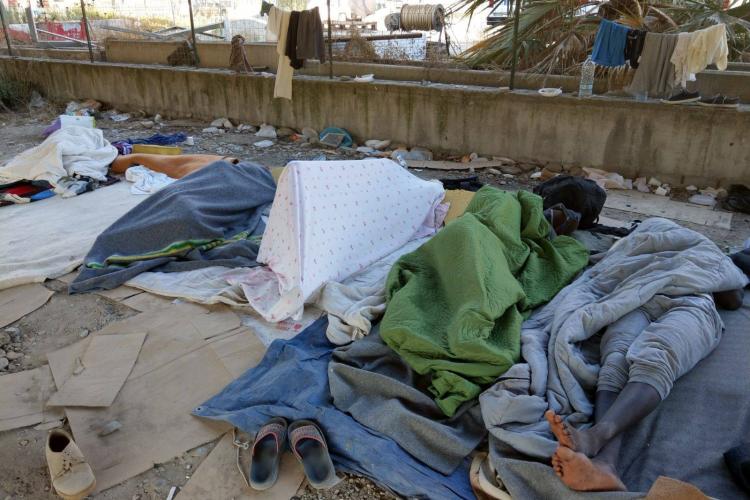Mental Health in Displacement – A Widespread Yet Largely Overlooked Crisis
Posted:
Time to read:
Guest post by Bobby Lloyd, Miriam Usiskin, Naomi Press (HCPC registered art therapists and core Art Refuge UK team working in northern France) and Marta Welander (Executive Director, Refugee Rights Europe). Established in 2006, Art Refuge UK is a small, robust charity that works through art and art therapy with people who have been displaced due to war, persecution and poverty. Bobby Lloyd, Miriam Usiskin and Naomi Press are visual artists and HCPC registered art therapists. They make up the core Art Refuge UK team in northern France which has delivered frontline work in collaboration with local French NGOs since 2015 and helps to strengthen other organisations working in the border area by leading a training for their frontline workers and volunteers in safe psychosocial practice and self-care.
A number of recent media reports have raised alarm bells about to the mental health of refugee children on the Greek island of Lesvos. According to these reports, acute mental health problems are highly prevalent, with children as young as 10 years of age having attempted suicide in the notorious Moria camp. Such mental health issues in displacement stretch far beyond the Greek island of Lesvos; indeed, they constitute a widespread yet largely overlooked crisis across Europe. Drawing on extensive field research and decades of professional mental health provision respectively, we argue that European actors must urgently turn their attention to the mental health situation in displacement, in order to create a safer and healthier environment for refugees and European host communities alike.

On the Greek islands, mental health concerns among refugees and displaced people are certainly nothing new. In 2016, NGOs operating on Lesvos warned of the high number of people displaying symptoms of post-traumatic stress disorder (PTSD). In May 2017, Refugee Rights Europe interviewed between 8-13% of the population on Chios and found that 31% of those who declared a health concern were referring to mental health issues rather than a physical ailment. A number of those interviewed had witnessed another refugee committing suicide, and several respondents – many of whom had arrived in Chios following experiences of war and conflict in Syria, Afghanistan and Iraq – expressed a sense of hopelessness and indicated forms of depression and anxiety. Alarmingly, only 28.5% of those with a health problem said they had been able to access support. Similarly, in October 2017, MSF warned that a mental health emergency for asylum seekers was unfolding on the Greek islands and called on the Greek authorities to urgently ‘step up the provision of mental healthcare, including psychiatric care and other crucial services, to meet the needs of these extremely traumatised men, women and children’. Less than a year later, in July 2018, MSF once again reported that Lesvos was now in a ‘sinking state of mental health’. This is further corroborated by Refugee Rights Europe’s own findings from Lesvos in June 2018 in which an alarming 45.9% of respondents with a health issue described it as a mental health concern.

In northern France, where the charity Art Refuge UK has been operating psychosocial support activities since 2015, the situation is becoming equally as acute. The majority of refugees they have worked with, over the past three years, have exhibited incredible resilience and extraordinary capacity for hope, patience and faith in humanity; the team has been humbled by people’s ability to draw upon their internal coping strategies and the support of other refugees and those few services that are operating in the area. However, there are worrying numbers for whom the desperate, sustained situation is beginning to take its toll and tip individuals into experiencing serious mental health issues.
The Art Refuge UK team has seen an increase in clear signs of depression, anxiety and hopelessness as people get trapped in a cycle of rejection from countries across Europe and in the case of northern France, at the border, with no obvious way out of their predicament. When individuals’ complex layers of trauma from their country of origin and/or their journey to and across Europe are compounded with ongoing, sustained abuses and a lack of recourse to support and sanctuary, this intolerable set of circumstances risks pushing people into further mental health problems, making them more at risk to themselves as well as to others. Being in an enhanced state of sensory sensitivity for prolonged periods can have a long-term impact on the body and may tip people into paranoia, overwhelming anxiety, anger, hyper-vigilance and aggression.
Across three years in Calais, numerous individuals have spoken to the Art Refuge UK team of having their mobile phones deliberately smashed by police officers; an act which severs people’s connections with family at home and which disorientates them further. ‘I can’t speak to my mother anymore’, ‘all my contacts are lost’, ‘I can’t find out where I am going’. Such an assault on people’s connections can reduce their ability to trust, to feel safe, and can have a profound impact on their mental health. Further systematic abuse on the part of the authorities which includes sustained aggression, disruption of sleep, destruction of tents and confiscation of basic necessities, even drinking water, is taking its toll on people’s mental as well as physical health in worrying ways, appearing to have tipped many people beyond their ability to draw upon their own coping mechanisms, into mental health conditions which can lead to long lasting damage.
Art Refuge UK’s participants in psychosocial groups in Calais often speak of sleep deprivation and not being able to ‘think straight’. As a particularly insidious form of torture, sleep deprivation disrupts a basic biological necessity and can amount to an assault on a person’s entire immune system, leading again to mental ill health. The negative impact of sleep deprivation is made worse when a person is already injured, physically sick or traumatised. Being in an enhanced state of sensory sensitivity can also have a long-term impact on the body stress and makes people more vulnerable to long-term illness.

Art Refuge UK and their French partners have also seen a rapid increase in the use of drugs and alcohol amongst refugees in the Calais area, and it is not surprising that such self-medication is resorted to, in this context, to alleviate the effects of systematic abuse and mediate the complex psychological and physiological impact on the body. The team has also seen signs of self-harm manifested in a disregard for personal safety, with an increase in high-risk behaviours, such as people taking greater risks when jumping on or hiding under lorries. The team is aware that other self-harming behaviour is present but less easy to detect.
Such observations resonate with Refugee Rights Europe’s research findings. When surveying 223 people in Calais in October 2017, a whole 21.2% of those with health issues self-declared that these issues were mental health issues rather than a physical problem. This is a markedly higher figure than in April 2017, when 16.4% reported the same. A significant number of respondents were seen speaking to themselves, and several respondents mentioned that one or more of their peers appeared to be ‘going crazy’. Some of the young boys told the research team that one of their peers, a 12-year old boy from Afghanistan, had recently self-harmed and tried to kill himself because he was so unhappy with his situation. Many respondents cited the lack of sleep as the main factor making them feel mentally unwell, and others cited the seemingly hopeless situation in which they found themselves. A significant number of respondents were using sleeping pills to relax and try to get some sleep at night. However, the ongoing police raids make it difficult for people to get more than a few hours’ sleep per night, if any at all.
In light of such research findings, it is particularly alarming that specialist mental health support available in the area is very limited, with a few groups, including Art Refuge UK and Médecins du Monde, working relentlessly to provide a minimum of mental health support and increase the resilience among the hundreds of individuals circulating in the area. As mental health experts with decades of experience within the NHS and other contexts, Art Refuge UK’s team is increasingly worried by the sustained decline in people’s mental health, witnessing that many now appear to have reached the point of distressing exhaustion. The local hospital rarely accepts anyone without asylum or an ongoing asylum claim in France, which means that state psychiatric support, is entirely inaccessible to some of those who may be in greatest need. This denial of help poses a potential risk to the individuals themselves, as well as those in their surroundings.

Meanwhile, at a third location, the French-Italian border in Ventimiglia, most individuals in displacement have entered Europe via Libya, where conditions are well known to be nothing short of atrocious. During a Refugee Rights Europe research study in August 2017, 17.1% out of 150 respondents described their health problem as a mental health issue rather than a physical ailment. Alarmingly, only 14.5% of those with a health problem had been able to access support. Amongst those who recounted traumatic experiences in Libya was a Sudanese man, who explained that he had lost his brother on the sea when a vessel sank, and had also witnessed an infant being shot by Libyans whilst in the vessel in his mother’s arms. A further respondent said he was feeling unwell because he had bad memories of seeing hundreds of fellow refugees shot dead in Libya. He explained that there had been some 450 of them to begin with, but only he and some 70 others made it out alive. Meanwhile, a Sudanese minor had been hung by his fingers for an extended period by Libyan traffickers and showed his disfigured fingers to the research team.
Similarly, Art Refuge UK regularly hears of accounts from Libya among the displaced people they work with. Recently young men who attend the charity’s activities have spoken about witnessing others being filmed while having petrol thrown over them, and needing to beg their families for a ransom over the phone. One young man in the past week has said he would have been shot if his family did not agree to raise the money that was being demanded from him. In such a manner, the displaced people in transit across Europe tell stories of the prisons they have survived, the ransom deals they have managed to handle, the boat trips they have survived, and the violent borders they have crossed. Having lived through such unfathomable experiences, it is of utmost importance that individuals receive the respect, as well as medical and mental health support they need to recover and heal, yet these individuals currently find themselves unable to access safety, sanctuary and support in Europe.
As is true for all demographic groups in society, untreated mental health problems risk causing long-term damage on the individuals themselves, whilst it could also lead to serious societal repercussions in the worst of cases. In Calais, Art Refuge UK warns that the systematic abuse witnessed in the area has inevitably increased levels of depression, anger, anxiety and aggression. Meanwhile in the UK, three young Eritrean boys have taken their own lives since November last year, highlighting the acute dangers of self-harm resulting from untreated mental health problems and lack of support available to individuals who are struggling to re-establish home for themselves after experiences of sustained danger and uncertainty.
There is thus an acute need to ensure more adequate attention to mental health, which ought to lie at the heart of the European refugee response in order to create a safer environment for refugees and European host communities alike. The declining mental health among displaced people is evidently a widespread yet largely overlooked crisis, which requires a concerted and cross-sectoral effort between actors to prevent current and future damage to individuals and communities across the continent.
Any comments about this post? Get in touch with us! Send us an email, or post a comment here or on Facebook. You can also tweet us.
__________
How to cite this blog post (Harvard style)
Lloyd, B., Usiskin, M., Press, N. and Welander, M. (2018) Mental Health in Displacement – A Widespread Yet Largely Overlooked Crisis. Available at: https://www.law.ox.ac.uk/research-subject-groups/centre-criminology/centreborder-criminologies/blog/2018/10/mental-health (Accessed [date]).
Share:








